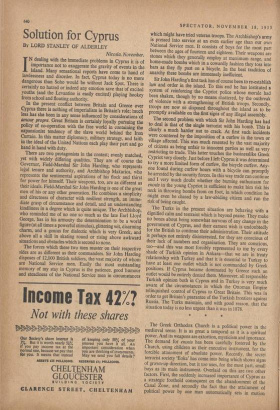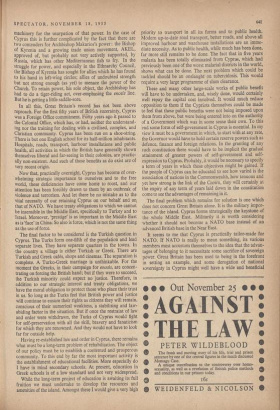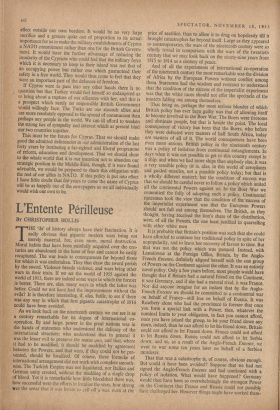Solution for Cyprus
BY LORD STANLEY OF ALDERLEY
Nicosia, November.
IN dealing with the immediate problems in Cyprus it is of importance not to exaggerate the gravity of events in the island. Many sensational reports have come to hand of lawlessness and disorder. In fact, Cyprus today is no more dangerous than Soho would be without Jack Spot. There is certainly no hatred or indeed any emotion save that of excited youths (and the Levantine is easily excited) playing hookey from school and flouting authority.
In the present conflict between Britain and Greece over Cyprus there is nothing of imperialism in Britain's role; Much less has she been in any sense influenced by considerations of amour propre. Great Britain is certainly loyally pursuing the policy of co-operation with the free world in containing the expansionist tendency of the slave world behind the Iron Curtain. In this matter diplomacy, military strategy, and faith in the ideal of the United Nations each play their part and go hand in hand with duty.
There are two protagonists in the contest; evenly matched, yet with widely differing qualities. They are of course the Governor, Field-Marshal Sir John Harding, who represents legal tenure and authority, and Archbishop Makarios, who represents the sentimental aspirations of his flock and thirst for power for himself. Their weapons, too, are as different as their ideals. Field-Marshal Sir John Harding is one of the great men of his or any other generation. He combines a simplicity and directness of character with resilient strength, an imme- diate grasp of circumstance and detail, and an understanding kindliness in a degree which is quite unique. The Archbishop, who reminded me of no one so much as the late Earl Lloyd George, has in his armoury the determination to be a world figure (at all times a powerful stimulus), glittering wit, disarming charm, and a genius for dialectic which is very Greek, and above all a skill in skating round or rising above awkward situations and obstacles which is second to none.
The forces which these two men muster on their respective sides are as different as their commanders. Sir John Harding disposes of 12,000 British soldiers, the vast majority of whom are National Service men. Easily the most outstanding memory of my stay in Cyprus is the patience. good humour and steadiness of the National Service men in circumstances which might have tried veteran troops. The Archbishop's army is pressed into service at an even earlier age than our own National Service men. It consists of boys for the most part between the ages of fourteen and eighteen. Their weapons are stones which they generally employ at maximum range, and home-made bombs which in a cowardly fashion they toss into bars as they fly past on a bicycle. In the best tradition of anarchy these bombs are immensely inefficient.
Sir John Harding's first task has of course been to re-establish law and order in the island. To this end he has instituted a system of reinforcing the Cypriot police whose morale had been shaken, though by no means shattered, by the outbreak of violence with a strengthening of British troops. Secondly, troops are now so disposed throughout the island as to be promptly available on the first signs of any illegal assembly.
The second problem with which Sir John Harding has had to deal is that of the single terrorist with his bomb. This is clearly a much harder nut to crack. At first such incidents were countered by the imposition of a curfew in the town or village affected. This was much resented by the vast majority of citizens as being unfair to innocent parties as well as very restricting to trade. This latter touches the businesslike Greek Cypriot very closely. Just before I left Cyprus it was determined to try a more limited form of curfew, the bicycle curfew. Any- one found during curfew hours with a bicycle can promptly be arrested by the security forces. In this way trade can continue and I very much doubt whether the burning enthusiasm for enosis in the young Cypriot is sufficient to make him risk his neck in throwing bombs from on foot, in which condition he might even be chased by a law-abiding citizen and run the risk of being caught.
The Turks in the present situation are behaving with a dignified calm and restraint which is beyond praise. They make no bones about being somewhat nervous of any change in the government of Cyprus, and their earnest wish is undoubtedly for the British to continue their administration. Their attitude is perhaps not entirely disinterested, for they are conscious of their lack of numbers and organisation. They are conscious, too—and this was most forcibly represented to me by every shade of Turkish opinion in Ankara—that we are in treaty relationship with Turkey and that it is essential to Turkey to have at least one outlet which is not commanded by Greek positions. If Cyprus became dominated by Greece such an outlet would be entirely denied them. Moreover, all responsible Turkish opinion both in Cyprus and in Turkey is very much aware of the circumstances in which the Ottoman Empire relinquished control of Cyprus to Great Britain. This was in order to get Britain's guarantee of the Turkish frontiers against Russia. The Turks maintain, and with good reason, that the situation today is no less urgent than it was in 1878.
The Greek Orthodox Church is a political power in the medieval sense. It is as great a temporal as it is a spiritual power. And its weapons are extortion, mysticism and ignorance. The demand for enosis has been carefully fostered by the Church, using children as their executive instrument, for the forcible attainment of absolute power. Recently, the secret terrorist society Toka' has come into being which shows signs of grown-up direction, but it too uses, for the most part, small boys as its main instrument. Overlaid on this are two other factors. First, the suddenly increased importance of Cyprus as a strategic foothold consequent on the abandonment of the Canal Zone; and secondly the fact that the attainment of political power by one man automatically sets in motion machinery for the usurpation of that power. In the case of Cyprus this is further complicated by the fact that there are two contenders for Archbishop Makarios's power: the Bishop of Kyrenia and a growing trade union movement, AKEL, approved of, but probably not very actively supported, by Russia, which has other Mediterranean fish to fry. In the struggle for power, and especially in the Ethnarchy Council, the Bishop of Kyrenia has sought for allies which he has found to his hand in left-wing circles; allies of undoubted strength but not strong enough (as yet) to menace the power of the Church. To retain power, his sole object, the Archbishop has had to do a tiger-riding act, over-emphasing the enosis line. But he is getting a little saddle-sore.
In all this, Great Britain's record has not been above reproach. For the first fifty years of British suzerainty, Cyprus was a Foreign Office commitment. Forty years ago it passed to the Colonial Office, which has, or had, neither the understand- ing nor the training for dealing with a civilised, complex, and Christian community. Cyprus has been run on a shoe-string. There is but one English school for its half-million inhabitants. Hospitals, roads, transport, harbour installations and public health, all activities in which the British have generally shown themselves liberal and far-seeing in their colonies, are practic- ally non-existent. And such of these benefits as do exist are of very recent origin.
Now that, practically overnight, Cyprus has become of over- whelming strategic importance to ourselves and to the free world, these deficiencies have come home to roost, and our attention has been forcibly drawn to them by an outbreak of violence and terrorism. And let there be no mistake as to the vital necessity of our retaining Cyprus on our behalf and on that of NATO. We have treaty obligations to which we cannot be insensible in the Middle East, specifically to Turkey and to Israel. Moreover, 'prestige' is as important in the Middle East as is 'face' in China. So also is force, which is not the same thing as the use of force.
The final factor to be considered is the Turkish question in Cyprus. The Turks form one-fifth of the population and lead separate lives. They have separate quarters in the towns. In the country a village is either Turkish or Greek. There are Turkish and Greek cafés, shops and cinemas. The separation is complete. A Turko-Greek marriage is unthinkable. For the moment the Greeks, in their campaign for enosis, are concen- trating on forcing the British hand; but if they were to succeed, the Turkish minority could expect no justice. Therefore, in addition to our strategic interest and treaty obligations, we have the moral obligation to protect those who place their trust in us. So long as the Turks feel that British power and justice will continue to ensure their rights as citizens they will remain, conscious of their numerical weakness, a stabilising and law- abiding factor in the situation. But if once the restraint of law and order were withdrawn, the Turks of Cyprus would fight for self-preservation with all the skill, bravery and fanaticism for which they are renowned. And they would not have to look far for outside help. .
Having re-established law and order in Cyprus, there remains what must be- a long-term problem of rehabilitation. The object of our policy must be to establish a contented and prosperous community. To this end by far the most important activity is the establishment of educational facilities. More especially do I have in mind secondary schools. At present, education in Greek schools is of a low standard and not very widespread.
While the long-term project of education is awaiting its full fruition we must undertake to develop the resources and amenities of the island. Amongst these I would give a very high priority to transport in all its forms and to public health. Modern up-to-date road transport, better roads, and above all improved harbour and warehouse installations are an imme- diate necessity. As to public health, while much has been done, far more still remains to be done. The fact that in five years malaria has been totally eliminated from Cyprus, which had previously been one of the worst malarial districts in the world, shows what can be done. The next problem which could be tackled should be an onslaught on tuberculosis. This would require a very large programme of slum clearance.
These and many other large-scale works of public benefit will have to be undertaken, and, wisely done, would certainly well repay the capital cost involved. It would much reduce opposition to them if the Cypriots themselves could be made to feel that these public benefits were not being imposed upon them from above, but were being entered into on the authority of a Government which was in some sense their own. To this end some form of self-government in Cyprus is essential. In my view it must be a government in which, to start with at any rate, the Governor would have to hold certain reserve powers such as defence, finance and foreign relations. In the granting of any such constitution there would have to be implicit the gradual attainment of greater powers of self-government and self- expression to Cyprus. Probably, it would be necessary to specify a term of years in which these objectives might be gained. If the people of Cyprus can be educated to see how varied is the association of nations in the Commonwealth, how tenuous and yet how strong is the link of the Crown, they will certainly at the expiry of any term of years laid down in the constitution come to see the advantages of remaining in it.
The final problem which remains for solution is one which does not concern Great Britain alone. It is the military impor- tance of the island. Cyprus forms strategically the keystone of the whole Middle East. Militarily it is worth considering whether it should not become a NATO base instead of an advanced British base in the Near East.
It seems to me that Cyprus is practically tailor-made for NATO. If NATO is really to mean something, its various members must accustom themselves to the idea that the advan- tages of belonging to it necessitate some sacrifice of sovereign power. Great Britain has been used to being in the forefront in setting an example, and some derogation of national sovereignty in Cyprus might well have a wide and beneficial effect outside our own borders. It would be no very large sacrifice and a gesture quite out of proportion to its actual importance for us to make the military establishments of Cyprus a NATO commitment rather than one for the British Govern- ment. It would have the further advantage of reducing the insularity of the Cypriots who could feel that the military force which it is necessary to keep in their island was not that of an occupying power but rather one which guaranteed their safety in a free world. They would thus come to feel that they were an important part of the defences of freedom.
If Cyprus were to pass into any other hands there is no question but that Turkey would feel herself so endangered as to bring about a rupture of our alliances with her, and this is a prospect which surely no responsible British Government would willingly face. The Turks are our staunch allies and are more resolutely opposed to the spread of communism than perhaps any people in the world. We can ill afford to weaken the strong ties of sympathy and interest which at present bind our two countries together.
This must be the future for Cyprus. That we should make good the admitted deficiencies in our administration of the last forty years by instituting a far-sighted and liberal programme of reform, education and development. That we should show to the whole world that it is our intention not to abandon our strategic position in the Middle East, though, if it were found advisable, we would be prepared to share this obligation with the rest of our allies in NATO. If this policy is put into effect I have little doubt that for years to come the name of Cyprus will be as happily out of the newspapers as we all individually would wish our own to be.












































































 Previous page
Previous page